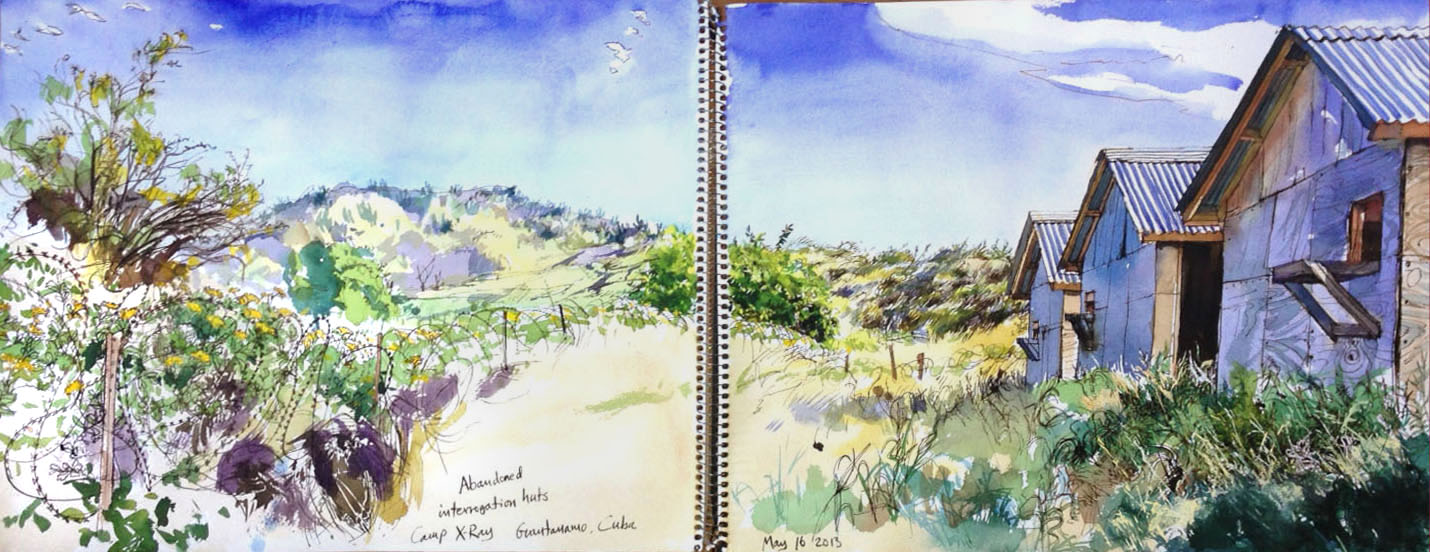
STEVE MUMFORD
The Snow Leopard
October 19 - November 23, 2013

Known for his drawings from the war zones of Iraq and Afghanistan, Steve Mumford was commissioned by Harper's Magazine to go
to Guantanamo. He made two trips in February and May 2013. Current issue of Harper's includes a portfolio of his drawings
along with Lawrence Douglas' cover story A Kangaroo in Obama's Court.
Steve Mumford:
I traveled to Guantanamo Naval Base for the first time last winter, to illustrate a story for Harper's Magazine on the military
trial of al Nashiri, accused of leading the attack on the USS Cole, and tortured many times under US custody.
Nashiri, quiet and wearing an unassuming white tee shirt was hardly noticeable as I drew the scene through the multiple sealed
panes of security glass in the media area at the far rear of the large, bland courtroom. More striking were the overhead TV screens
and audio of the same scene, on a 40 second delay, a disorienting counterpart to the live scene in front of us, a perfect
embodiment of the secrecy and paranoia embedded within Gitmo's culture.
The hearings lasted a day and a half, before getting sidelined in delays; with several days left, I poked around the sprawling
US-administered piece of Cuba with my escort from the Public Affairs Office, looking for compelling things to draw.
I found my subject in Camp X-Ray, a hauntingly beautiful ruin of a simple prison camp, hastily-erected on a scrubby, deserted
windswept plain overlooked by a ridge of distant hills. I could see the guard towers of the Cuban border following that ridge,
looking down at us.
X-Ray was built in a hurry and consists of nothing more than chainlink fencing, razor wire and a few plywood huts and guard towers.
Abandoned for a decade, nature has taken over: the fencing and razor wire is covered in vines, many of which were in flower on my
2nd visit. Tall wild grasses have spread throughout the grounds, and huge iguanas and banana rats have made X-Ray their home.
At one edge of the camp sit a few forlorn wooden huts, slowly settling into the earth. Their plywood floors are strewn with droppings
and vines are crowding in. These are where the CIA applied their enhanced interrogation techniques to the newly arrived prisoners
from Afghanistan. The wind constantly whistles through these empty, sun-soaked haunted spaces.
The prisons where the last 166 detainees are being held are small, high-security fortresses, their design and detail impregnable
and generic. It was in one of these where a sergeant of the MP unit in charge of the prison incredulously informed me that there was
no way that I would be able to see, let alone draw any of the detainees, even though this had been the stated purpose of the trip
and agreed to by the Public Affairs Unit.
For two days I drew the interiors of the facility as well as the MPs assigned to me, while they lounged on the bolted-down prison
chairs and chatted. Then word would be passed down that a detainee was being moved from somewhere to somewhere else, and I would be
hastily escorted to another part of the prison to draw until the danger of us seeing one another was over.
I drew everything associated with the prisoners but the prisoners themselves. I even drew a dim hallway echoing with the strains of
an early morning call to prayer, as the prisoners crouched in their cells a few feet away, but behind thick steel doors.
I only once caught a glimpse of some detainees, when a cord snapped, the wind blew some fabric away from a fence and I saw,
momentarily, magically, a few distant figures, lean in white tee shirts playing soccer. Then they were gone.
The subject of my Gitmo drawings is the very thing never pictured. And then the subject becomes the reason why they aren't there.
I was reminded of a passage from Peter Matthiessen's classic travel memoir about expectation, ambition and self. Matthiessen
desperately wants to see the animal he's journeyed so far to write about, but is destined to never see. His Zen teacher tells him
before he leaves, Expect nothing.
It doesn't exactly work and yet it does.